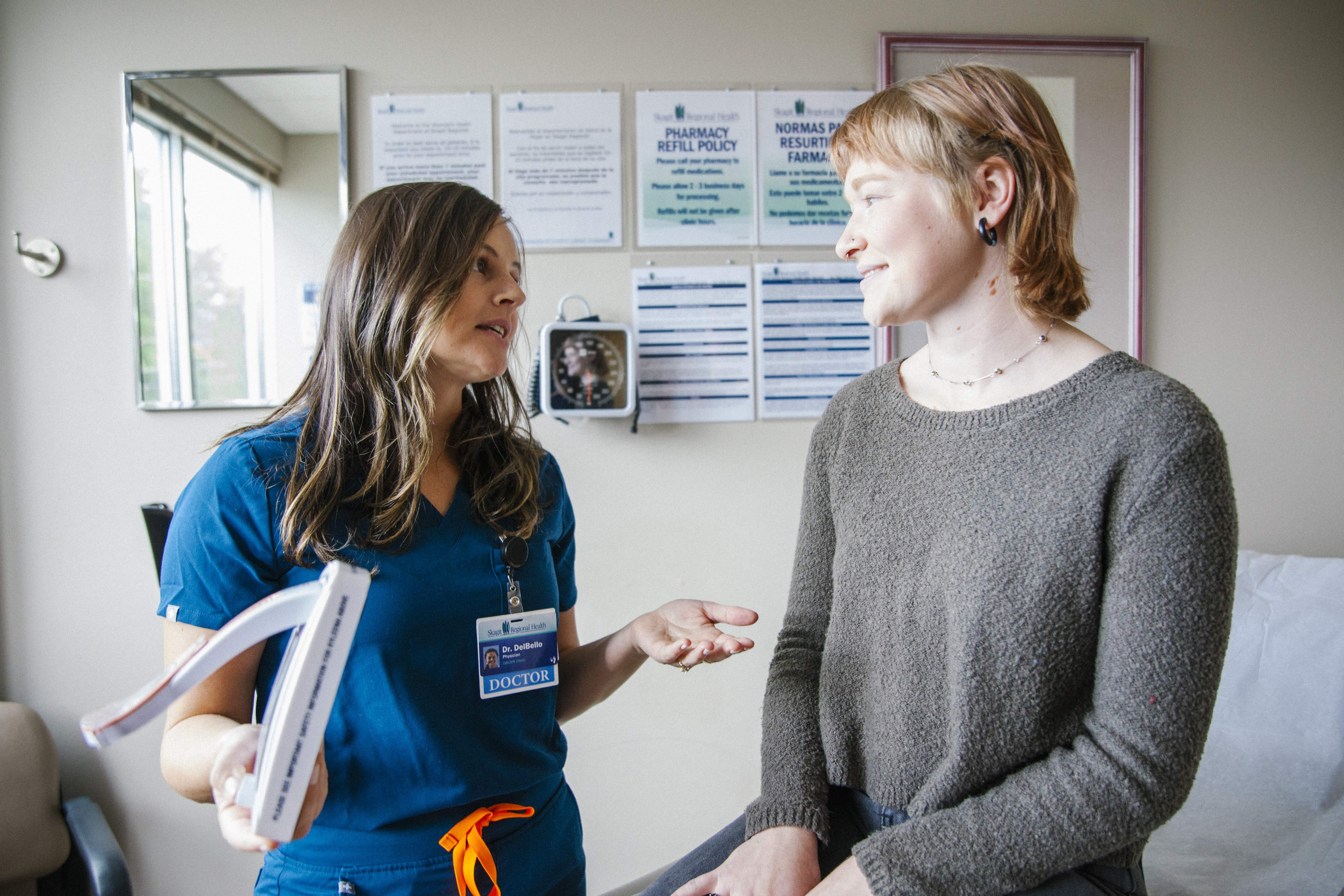Historias de HealthQuest
Historias de pacientes
Suscríbase a nuestro boletín informativo electrónico
5 formas de empezar a darse prioridad a USTED misma

¿Le resulta difícil darle prioridad a su salud? Si es así, no está sola. Una encuesta sobre la salud de la mujer realizada por Hologic y Gallup en abril de 2024 reveló que más de seis de cada 10 mujeres en EE. UU. admitieron que les resulta difícil darle prioridad a su salud. Al preguntarles por qué, el 72 % de las mujeres respondió que eso se siente demasiado difícil de manejar.
Sin embargo, darle prioridad a su salud no tiene por qué sentirse como algo abrumador. A menudo, la parte más difícil es simplemente comenzar. Ahí es donde el equipo de Salud de la Mujer en Skagit Regional Health puede ayudarla. Para ayudarle a empezar, aquí reunimos cinco formas sencillas en las que puede empezar a darle prioridad a su salud desde ahora.
1. Programe exámenes de bienestar anuales
Los exámenes anuales son fundamentales para mantener su salud en general. Por lo general, estas citas incluyen una evaluación de riesgos para la salud, un examen físico y una revisión de medicación. También son el momento perfecto para discutir cualquier pregunta o inquietud con su médico.
"Como su equipo de atención, estamos aquí para apoyarla en su camino hacia la salud y el bienestar", dice Katheryn DelBello, MD de ginecología/obstetricia en Skagit Regional Clinics - Mount Vernon. "Los chequeos anuales nos brindan un panorama completo de su salud". "Esto nos ayuda a crear el mejor plan para mantener su cuerpo y mente saludables, e identificar cualquier factor de riesgo potencial de manera temprana".
Si ha pasado más de un año desde su último examen de bienestar, ahora es un excelente momento para programar uno. Póngase en contacto con el consultorio de su médico de cabecera para agendar una cita.
¿Necesita un médico de cabecera? Llame al 360-848-5555 para encontrar un proveedor de Skagit Regional Health cerca de usted.
2. Manténgase al día con los exámenes de rutina para la detección del cáncer
Los exámenes de detección del cáncer de rutina ayudan a detectar el cáncer de manera temprana, a menudo antes de que note cualquier síntoma, lo que le da al tratamiento la mejor oportunidad de éxito. La American Cancer Society recomienda estas pautas para los exámenes:
- Las mujeres de entre 40 y 44 años pueden comenzar a hacerse los exámenes anuales de detección cáncer de mama a través de mamografías si así lo desean.
- Las mujeres de entre 45 y 54 años deben hacerse mamografías cada año.
- Las mujeres de 55 años o más pueden pasar a hacerse mamografías cada dos años, o pueden continuar con los exámenes anuales.

- A partir de los 45 años, las personas con un riesgo promedio de sufrir cáncer colorrectal deben comenzar con los exámenes regulares.
- Si se encuentra en buen estado de salud, continúe con los exámenes regulares hasta los 75 años.
- Las personas mayores de 85 y en buen estado de salud ya no deben hacerse exámenes de cáncer colorrectal.
Cáncer cervical:
- Las mujeres de entre 21 y 25 años deben comenzar a hacerse exámenes de detección de cáncer cervical.
- Las mujeres mayores de 65 años y en buen estado de salud ya no deben hacerse exámenes de cáncer cervical.
Hable con su médico de cabecera para recibir recomendaciones específicas sobre los exámenes basadas en sus riesgos individuales y para programar una cita.
3. Manténgase activa
Cuanto más físicamente activa sea, mayores serán los beneficios para su salud. Según las directrices de actividad física para estadounidenses, cada semana las mujeres deben aspirar a realizar:
- 150 minutos (2.5 horas) de actividad aeróbica de intensidad moderada, O
- 75 minutos (1.25 horas) de actividad aeróbica de alta intensidad, O
- Una combinación de actividad aeróbica de intensidad moderada y alta, MÁS
- Actividades de fortalecimiento muscular en dos o más días.
"Cualquier actividad física es mejor que ninguna. Mantenerse activa es esencial para las mujeres en todas las etapas de la vida”, afirma la Dra. DelBello. "Hable con su médico sobre cómo incorporar la actividad física en su rutina según su edad, etapa de vida y capacidades físicas".
4. Incorpore alimentos saludables y nutritivos en su alimentación
Su salud digestiva desempeña un papel fundamental en su bienestar general. Incorporar alimentos más saludables en sus comidas diarias puede generar cambios positivos en su salud. Concéntrese en consumir más alimentos de origen vegetal, como frutas, verduras de hoja verde, granos integrales, proteínas magras y legumbres (como chícharos, frijoles y lentejas). Limite los alimentos procesados, azúcares refinados, edulcorantes artificiales, alimentos fritos y opciones con alto contenido de sodio.
Aquí tiene algunos objetivos sencillos para comenzar:
- Reemplace las bebidas azucaradas por agua con limón.
- Añada al menos una verdura a cada comida.
- Mantenga un tazón de frutas enteras en el mostrador de la cocina para contar con un refrigerio rápido.
- Reemplace la mantequilla por aceite de oliva u otros aceites saludables al cocinar.
¡Los pequeños cambios pueden marcar la diferencia en su salud con el tiempo!
5. Controle su estrés
Cuando están bajo estrés, las mujeres suelen ser menos propensas a priorizar su salud. El estrés no gestionado puede afectar negativamente la salud de las mujeres y está relacionado con problemas como:
- Problemas cardíacos
- Dolores de cabeza y migrañas
- Afecciones estomacales
- Obesidad
- Dificultad para quedar embarazada
- Alteraciones del ciclo menstrual

La American Heart Association recomienda adoptar hábitos diarios saludables para ayudar a controlar el estrés de manera más efectiva, tales como:
- Actividad física regular para mejorar el estado de ánimo, la energía y el sueño.
- Alimentación saludable con comidas nutritivas y equilibradas.
- Tomarse descansos para recargar energías al alejarse de las listas de tareas y disfrutar de pasatiempos.
- Conectarse con la familia, amigos y grupos sociales.
- Descansar lo suficiente procurando lograr siete o más horas de sueño calidad cada noche.
- Practicar la meditación para ayudar a calmar la mente.
"Si el estrés se vuelve demasiado abrumador, consulte a un profesional de la salud", recomienda la Dra. DelBello. "La salud mental es tan importante como la física y se debe priorizar siempre".
Su salud es importante, y no hay mejor momento para priorizarla que ahora. En Skagit Regional Health, estamos aquí para apoyarla en cada paso del camino.

.png?sfvrsn=a41c6a3e_1)



